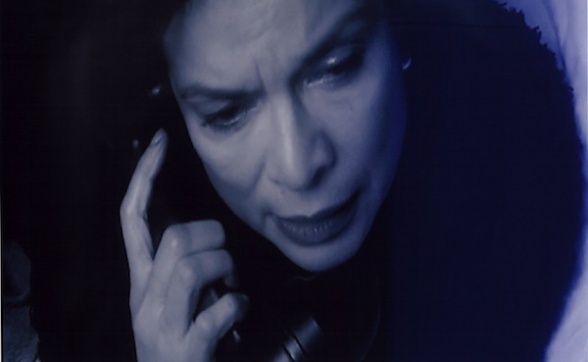| M | T | W | T | F | S | S |
|---|---|---|---|---|---|---|
| 1 | ||||||
| 2 | 3 | 4 | 5 | 6 | 7 | 8 |
| 9 | 10 | 11 | 12 | 13 | 14 | 15 |
| 16 | 17 | 18 | 19 | 20 | 21 | 22 |
| 23 | 24 | 25 | 26 | 27 | 28 | |
The End of Human Voice is the latest chapter in Vezzoli’s exploratory and productive rewriting of film history. The artist constructs the film out of elements drawn from grand traditions and minor details, connecting literary, visual and popular influences in circuitous narratives. Bianca Jagger’s soliloquy in the film derives from Jean Cocteau’s monologue for theatre, The Human Voice (1930) and Vezzoli’s character is based on the actor in Cocteau’s last film, The Testament of Orpheus (1960). The Royal Suite at Claridge’s Hotel where The End of the Human Voice was filmed was once Cocteau’s London abode. The multiple allusions and cross-references extend to present circumstances, as evidenced in Vezzoli’s clever casting of Bianca Jagger as the main protagonist – Jagger’s own biography includes a painful separation as well as a stint as a journalist conducting telephone interviews for Andy Warhol’s Interview magazine. Vezzoli’s work takes the form of the homage, the reverent tribute to great masters, works and artists. He avoids the slight derision that usually underlies post-modern parody and the ironic appropriation of outdated stylistic or narrative modes and instead expresses his adoration through the creative reinterpretation of existing works. Vezzoli resurrects, in particular, the theatrical form of melodrama as a mode that attempts to communicate authentic high drama and genuine passion. The aphoristic quality of Cocteau’s script has, like all melodrama, a high degree of artificiality and affectation. However, performed with the right dramatic conviction and set in an appropriate scenic context, this style of presentation is able to communicate meaning with a grander ambition than is tolerated in most visual art today outside of television, Hollywood films and romantic novels. Vezzoli exalts nostalgia as a form of post-modern storytelling. The desire for a more sympathetic (in this case grander, more glamorous and passionate) past and the intense emotional yearning felt at the loss of a loved one (the most melodramatic moment here is of Love Story calibre) are embraced as one. The melodramatic moment is intensified through the addition of glamour: The End of the Human Voice paraphrases the cool filmic language of the 1930s-1950s period, creating allure through the luscious surface glamour of black and white film, the luxurious settings and the presence of a true diva. Strong female characters often take the active lead in his works, while Vezzoli usually casts himself in a passive role as an imaginary object of desire, creating wishful fantasies of living in a more glamorous era surrounded by one’s heroes. Vezzoli’s work thus fulfils another of the essential criteria of ‘camp’ – the self-stylisation of one’s own existence and exaltation of life to a work of art. Christoph Grunenberg
Project Credits Courtesy Castello di Rivoli Museo d'Arte Contemporanea With thanks to: Marcella Beccaria, Castello di Rivoli Museo d’Arte Contemporanea, Rivoli-Torino; Ida Gianelli; Gio Marconi, Milan; Franco Noero, Turin; Anthony d'Offay; Chiara Bersi Serlini.
Liverpool Biennial
55 New Bird Street
Liverpool L1 0BW
- T +44 (0)151 709 7444
- info@biennial.com
Liverpool Biennial is funded by
Founding Supporter
James Moores
